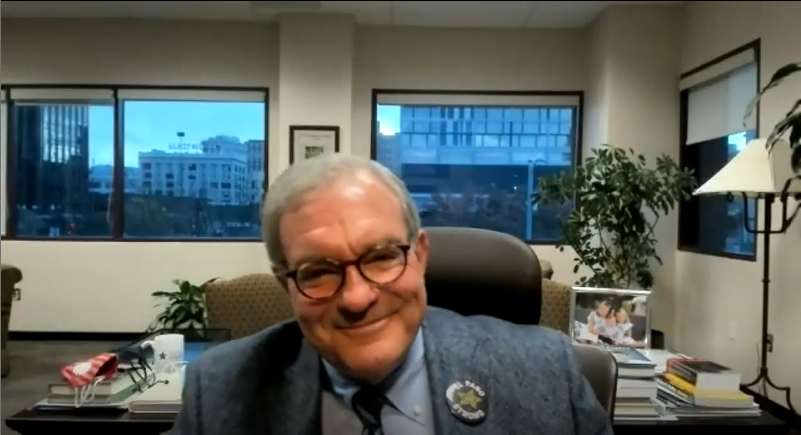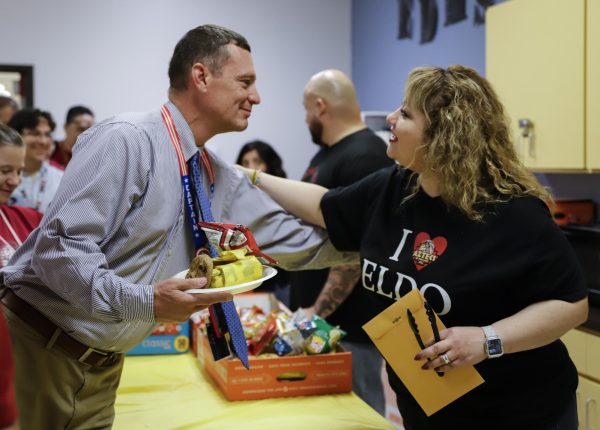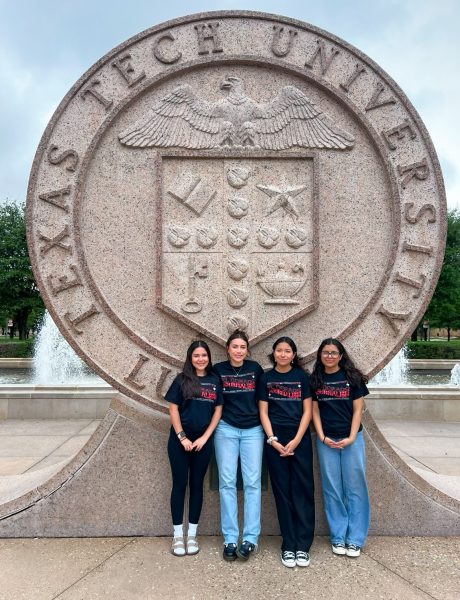Mayor Dee Margo shares track record ahead of Dec. 12 run-off election
Discussing accomplishments and challenges of his tenure, Mayor Dee Margo sits down for interview with student journalist as he faces run-off challenge from former mayor Oscar Leeser
Photo by Paola Duram
Mayor Dee Margo meets with AGO EIC and Aztec junior Paola Duran ahead of the Dec. 12 mayoral run-off election.
El Pasoans will head to the polls on Dec. 12 for the run-off election to decide who will be mayor for the next four years. Republican Mayor Dee Margo faces a challenge from Democratic former mayor Oscar Leeser. Margo agreed to an interview with the AGO News Editor-in-Chief Paola Duran before the Saturday contest. Here is the Q&A from that conversation, where Margo shares his background, why he should be reelected and plans to decrease 911 response times in Far East El Paso. Lastly, he gives advice to the young people of El Paso.
Q. What made you want to become the mayor of El Paso?
A. “Well to be quite candid, I’m not a political animal. I never had any desire to get into politics. My involvement was always in the background, supporting other candidates. I spent 35 years as a CEO, I was in business, and some years ago I became very frustrated when I thought El Paso was not properly represented at our state capital with our legislative delegation. Our reputation there was less than stellar. We had a lot of in-fighting in our delegation and I thought it was harmful to our community. When I grew up, I moved every three years. My father was kind of a vagabond, moved around and changed jobs, things like that and frankly, I hated that. When I came to El Paso I said, ‘I’m not moving.’ El Paso gave me roots and I’ve been here for 43 years.”
Q. What is something that sets El Paso apart from other communities?
A. “There’s no other place in the Western Hemisphere like El Paso, I mean we’re the largest bilingual, bi-national, bi-cultural region. Another thing is our history. We’ve been here over 350 years — 361 to be exact. We are the sixth-largest city in Texas. We’re the 20th or 21st largest city in the United States and we are the largest U.S city on the Mexican border. One of the biggest challenges that I’ve had as mayor is that people don’t know where we are or who we are or what we’re about.”
Q. How has this election been different from when you first ran for mayor?
A. “Well, I’ve got a record to run on, plus the crisis we’ve had to deal with. I mean, I don’t know of any mayor anywhere that’s had to deal with what we’ve had to deal with as a community in the last two years. It started in October of 2018 when I got a call from CBP [Customs and Border Patrol] to tell me that they were overwhelmed with migrants and they were going to start releasing them in our community. So, we had to marshal our resources and our NGOs, including the Annunciation House, to deal with that influx from primarily Central America, the three countries contiguous to Mexico.
We went through that until basically July of 2019 and then on August 3 we had the tragic shooting of an evil white supremacist, hate-filled individual coming from 700 miles away. As I’ve said before, I do not believe that person would have ever come from our region and secondly, it was an attack on who were as a community, who we are as a people and a culture. I’ve taken it very personally and I’ll continue to take it very personally. It’s very emotional for me. I attended all the funerals with my wife and I don’t want to ever have to do that again. That attack will not define El Paso. It will be a part of our history, but I want it relegated to a footnote because we are much better than that.”
Q. How do you think you’ve dealt with these situations better than others would?
A. “Well, I don’t know that you could characterize it ‘better than anyone else’ if you haven’t gone through it. I get calls to serve on national panels related to crisis management. I’m not sure I’m an expert on crisis management as much as I am a survivor of crisis and I’ve just done the best I could given the data we had at the time. On one hand, I could be referred to as Mayor Pinata, given what we’ve had to deal with and then the pandemic hits in March of this year. That’s when I declared my first emergency order and yet we really hadn’t completely healed from Aug. 3.
We didn’t even get to a full year where we could talk about it and see what else needed to be done. That’s one reason I want to continue as mayor. It’s been frustrating to me to a certain extent because I feel like what I’ve had to do is deal with what my predecessor didn’t do. I think that’s been very frustrating. I mean, just basic stuff like buying police vehicles. We’ve had to do more road repairs, fix potholes and fulfill the obligations of the Quality of Life Bond that was passed in 2012. Unfortunately, [former mayor Oscar] Leeser did nothing with [the bond] for his four years. I mean, I think he completed eight projects and we’ve completed 222.”
Q. What can El Pasoans do in terms of research when choosing a candidate?
A. “In my case, the judgment should be predicated on what I have done for three and a half years and in Leeser’s case, I aks, what did he do in four years? I think there is a dramatic difference between the two of us. Certainly, he has more name recognition and more marketing out there because of his dealership. I often find that most people don’t know the difference between his political ads and his automobile dealership ads. I didn’t have the luxury of that. All I’ve got is the day-to-day things I’ve been trying to do as mayor for the last three and a half years and my track record. So, I think I need to be reelected or not reelected based on that track record. Given all we’ve gone through, you don’t change leaders in the middle of a war and we’re still in the middle of a war with this pandemic.”
Q. What are some overlooked issues in El Paso right now that you think should be addressed? How will you address them?
A. “Well, we’re in a transformational time. There’s not going to be a reopening of our economy — there’s going to have to be rebuilding. The biggest challenge we have in El Paso was the fact that our tax pays is upside down. Seventy percent of our tax pays for property taxes is residential, that is, residential home owners. That works with a 50-50 between commercial and residential. So the only way we’re going to alleviate the tax burdens on your families and everybody else who owns homes is to have more investment and more jobs, and that’s what I’ve been working on — recruiting more industry and more jobs. That’s the only way we’re going to change things and rebuild our economy.
I went after the Amazon headquarters right after I became mayor and everybody said, ‘You can’t get there. It won’t happen,’ but I believed that there were things that needed to be out there about El Paso and the only way we would get that recognition would be to compete for headquarters. Then we announced a TJX which is the warehouse distribution operation for TJ MAXX, for Marshalls, for Home Goods and several others. That’s going to be almost two million square feet, it’s going to be a phenomenal structure. It’s going to have a $150 million worth of investment with 950 employees to be added and $30 million in annual payroll. Those are the kind of things we’ve got to work on, and that’s what I’ve been working on and can continue to work on.”
Q. What are you most proud of accomplishing during your years as mayor?
A. “The Public Safety Bond we did a year ago. There’s no police command center out in the Far East so Pebble Hills (station) responds to anybody that lives in the Far East and sometimes it’s at least 30 minutes to have a police response to a 911 call. That’s wrong. That’s not the way it should be. The Public Safety Bond is for $413 million and one of the first things we’re going to do with those funds is build a regional command center in the Far East. We identified some land and we’re doing some planning. The second thing we’ll do is open the far northwest of Trans Mountain, where we need another fire EMS station. We’re short there.
Then you look at the headquarters. The police headquarters is in the old Sears Roebuck building. The parking garage is already collapsed and has been torn down and it was built in 1947. It’s not user-friendly and it’s not hardened for safety purposes. So we’re going to build a new police headquarters. We’re going to do upgrades to the police training academy, the same thing for the fire training academy. The fire headquarters is in the BBVA Compass building downtown and that’s because Leeser cut a deal to take over the fire station for his dealership where it is now and moved the fire headquarters down to the BBVA Compass bank building, which makes no sense.”
Q. How do you feel about environmentalist issues in El Paso and how do you plan to address them?
A. “Well, one of the agreements we had with the purchase of the electric company by IIF was that they would help us put together a white paper (a way the government can present policy preferences before it introduces legislation) where we could attract more solar energy for El Paso and that requires a state legislative dictate. One of the things we’ve hired IIF to do is to help us provide a white paper that we can take to the legislature to say we want incentives for solar.
When we had the immigration crisis, which I think may start reoccurring, wait times on the bridges for trucks were as much 11 hours. If you take the bridge above Americas and BOTA, which is in the middle of residential areas, you have those trucks waiting there for 11 hours and you got significant ozone and pollution coming out. I had TxDOT do an analysis a year ago, back in March and April, when the slow downs on the bridge were so bad. What we found out was that we had increases of particulate ozone and other pollutants increased by like 160 or 170 percent. The only reason we didn’t have a health emergency at that time was that that was a period of high winds. Otherwise, if we don’t improve things, we have another slow down at the bridges, another immigration crisis — we’re going to have some significant health issues. I think we’re looking at what we can do from an environmental standpoint and seeing what we can do and what we can afford to do.”
Q. Do you think high school students should educate themselves in politics? Why should they?
A. “I think you ought to understand civics. You need to understand how government works, the function of government and how to hold people accountable. Understand the history of our government, understand how the state of Texas works. Most people don’t realize that in the state of Texas, the hierarchy and the subordinacy for the pandemic is from the governor to the county judge to me. The county judge outranks me and we’ve done pretty much everything in parallel, but the county judge has the authority and that’s how the state of Texas is designed. Understand how the state legislature works, understand especially how school districts work, and then understand the basics of the city and the county. People need to understand how the system works, and you all especially.”
Q. Could you offer any words of advice to the youth on leadership?
A. “Take advantage of every opportunity. Whether you’re successful or a failure, or you think you’re a failure, you’re not, you’re going to learn. Every opportunity you have to become involved is important. Sometimes some of us are thrust into it, whether we like it or not, and other times we’re seeking it, but I think it’s important that you get in as much leadership as you can. From a college admissions standpoint, that’s one of the things they look at — how many leadership opportunities have you had and participated in your high school career.
My father-in-law used to say, ‘There are givers and takers,’ and the way I kind of look at it is you’re either a part of the solution or you’re part of the problem. So, those that complain the most, the ankle biters, typically are the least involved. Get involved. Provide a solution. I get people that say, ‘I want to go into politics or I want to get involved in city government,’ or whatever. My advice is first to work in the private sector. Understand how the private sector works, what it’s like to have a job, to hire people, to train people because that’s critical. Because that’s what you’re doing in government — you’re serving. Government is not the be-all, end-all. It’s designed to serve the population so that you can grow. To me, a government is supposed to make sure there is a level playing field and there’s fairness across the board, so people have the ability to excel.”






